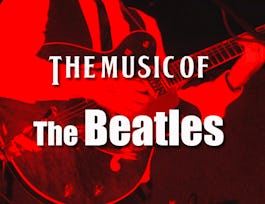This course, part 1 of a 2-course sequence, examines the history of rock, primarily as it unfolded in the United States, from the days before rock (pre-1955) to the end of the 1960s. This course covers the music of Elvis Presley, Chuck Berry, Phil Spector, Bob Dylan, the Beatles, the Rolling Stones, Jimi Hendrix, Cream, and many more artists, with an emphasis both on cultural context and on the music itself. We will also explore how developments in the music business and in technology helped shape the ways in which styles developed.


History of Rock, Part One
Taught in English
Some content may not be translated
60,998 already enrolled
(1,134 reviews)
What you'll learn
Students will be able to summarize and describe the evolution of rock music starting in the early 1950's to the end of the 1960's.
Details to know

Add to your LinkedIn profile
4 quizzes
See how employees at top companies are mastering in-demand skills


Earn a career certificate
Add this credential to your LinkedIn profile, resume, or CV
Share it on social media and in your performance review

There are 9 modules in this course
What's included
1 video7 readings
The Role of Tin Pan Alley in mainstream pop, the formation of a national audience through radio and the rise of television, the pre-rock pop of Frank Sinatra, Patti Page, and Les Paul and Mary Ford; rhythm and blues in the years before rock and roll; country and western and the rise of Nashville.
What's included
11 videos
Chart crossover and cover versions, the first hits of Bill Haley, Chuck Berry, Fats Domino, and Little Richard, the rise of Elvis Presley, the music of Jerry Lee Lewis and Buddy Holly, the rise of American Bandstand, the payola scandal and the "death of rock and roll."
What's included
8 videos1 quiz
Was this era the dark ages for rock music or was it a golden era cut short by the British invasion? The music of teen idols, the folk revival, early surf music, sweet soul, rockabilly pop, and girl groups. The Brill Building songwriters and the rise of the producer. Playlets and splatter platters.
What's included
9 videos
The Beatles transform the UK music scene and then invade America. Other Beatles-type British bands. The London blues scene and the Rolling Stones. Other Stones-type bands. The Who and the Kinks.
What's included
10 videos1 quiz
Dylan, the Byrds and folk rock. Garage bands in the northwest. Sonny and Cher and the legacy of Phil Spector. TV rock, Paul Revere and the Raiders, and the Monkees. Music in New York and Los Angeles.
What's included
7 videos
Berry Gordy and the rise and first flourishing of Motown. Atlantic, Stax, and southern soul (Memphis, Muscle Shoals, New York). Parallels between Motown and Stax. James Brown and the roots of funk.
What's included
7 videos1 quiz
How can music be psychedelic? Underground psychedelic scenes in San Francisco and London. Psychedelia in LA. The Summer of Love and the rise of hippie culture. The birth of FM rock and rock magazines. Woodstock and Altamont.
What's included
9 videos
Final exam for this course.
What's included
1 quiz
Instructor

Offered by
Recommended if you're interested in Music and Art

University of Florida

University of Rochester

University of Rochester

University of Rochester
Why people choose Coursera for their career




Learner reviews
Showing 3 of 1134
1,134 reviews
- 5 stars
84.85%
- 4 stars
13.46%
- 3 stars
0.79%
- 2 stars
0.35%
- 1 star
0.52%

Open new doors with Coursera Plus
Unlimited access to 7,000+ world-class courses, hands-on projects, and job-ready certificate programs - all included in your subscription
Advance your career with an online degree
Earn a degree from world-class universities - 100% online
Join over 3,400 global companies that choose Coursera for Business
Upskill your employees to excel in the digital economy
Frequently asked questions
Access to lectures and assignments depends on your type of enrollment. If you take a course in audit mode, you will be able to see most course materials for free. To access graded assignments and to earn a Certificate, you will need to purchase the Certificate experience, during or after your audit. If you don't see the audit option:
The course may not offer an audit option. You can try a Free Trial instead, or apply for Financial Aid.
The course may offer 'Full Course, No Certificate' instead. This option lets you see all course materials, submit required assessments, and get a final grade. This also means that you will not be able to purchase a Certificate experience.
When you purchase a Certificate you get access to all course materials, including graded assignments. Upon completing the course, your electronic Certificate will be added to your Accomplishments page - from there, you can print your Certificate or add it to your LinkedIn profile. If you only want to read and view the course content, you can audit the course for free.
You will be eligible for a full refund until two weeks after your payment date, or (for courses that have just launched) until two weeks after the first session of the course begins, whichever is later. You cannot receive a refund once you’ve earned a Course Certificate, even if you complete the course within the two-week refund period. See our full refund policy.


